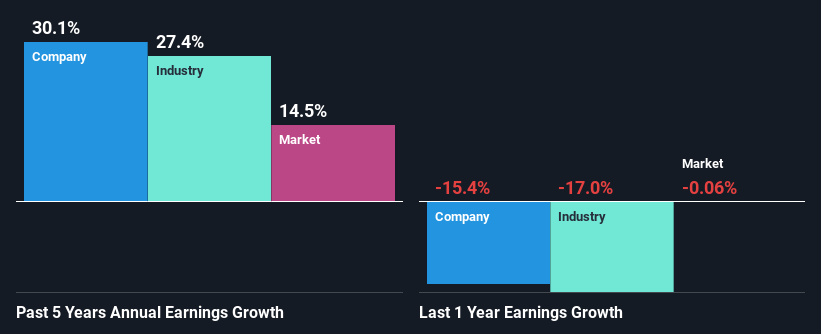Is KB Home's (NYSE:KBH) Recent Stock Performance Tethered To Its Strong Fundamentals?
Most readers would already be aware that KB Home's (NYSE:KBH) stock increased significantly by 37% over the past three months. Given that the market rewards strong financials in the long-term, we wonder if that is the case in this instance. In this article, we decided to focus on KB Home's ROE.
Return on equity or ROE is a key measure used to assess how efficiently a company's management is utilizing the company's capital. Put another way, it reveals the company's success at turning shareholder investments into profits.
View our latest analysis for KB Home
How Do You Calculate Return On Equity?
ROE can be calculated by using the formula:
Return on Equity = Net Profit (from continuing operations) ÷ Shareholders' Equity
So, based on the above formula, the ROE for KB Home is:
17% = US$656m ÷ US$3.8b (Based on the trailing twelve months to August 2023).
The 'return' is the yearly profit. Another way to think of that is that for every $1 worth of equity, the company was able to earn $0.17 in profit.
What Has ROE Got To Do With Earnings Growth?
So far, we've learned that ROE is a measure of a company's profitability. We now need to evaluate how much profit the company reinvests or "retains" for future growth which then gives us an idea about the growth potential of the company. Assuming all else is equal, companies that have both a higher return on equity and higher profit retention are usually the ones that have a higher growth rate when compared to companies that don't have the same features.
A Side By Side comparison of KB Home's Earnings Growth And 17% ROE
To begin with, KB Home seems to have a respectable ROE. And on comparing with the industry, we found that the the average industry ROE is similar at 16%. Consequently, this likely laid the ground for the impressive net income growth of 30% seen over the past five years by KB Home. We reckon that there could also be other factors at play here. For instance, the company has a low payout ratio or is being managed efficiently.
We then performed a comparison between KB Home's net income growth with the industry, which revealed that the company's growth is similar to the average industry growth of 27% in the same 5-year period.
Earnings growth is an important metric to consider when valuing a stock. The investor should try to establish if the expected growth or decline in earnings, whichever the case may be, is priced in. Doing so will help them establish if the stock's future looks promising or ominous. Is KB Home fairly valued compared to other companies? These 3 valuation measures might help you decide.
Is KB Home Efficiently Re-investing Its Profits?
KB Home's ' three-year median payout ratio is on the lower side at 9.0% implying that it is retaining a higher percentage (91%) of its profits. So it looks like KB Home is reinvesting profits heavily to grow its business, which shows in its earnings growth.
Additionally, KB Home has paid dividends over a period of at least ten years which means that the company is pretty serious about sharing its profits with shareholders. Looking at the current analyst consensus data, we can see that the company's future payout ratio is expected to rise to 11% over the next three years. Therefore, the expected rise in the payout ratio explains why the company's ROE is expected to decline to 12% over the same period.
Summary
On the whole, we feel that KB Home's performance has been quite good. Specifically, we like that the company is reinvesting a huge chunk of its profits at a high rate of return. This of course has caused the company to see substantial growth in its earnings. With that said, on studying the latest analyst forecasts, we found that while the company has seen growth in its past earnings, analysts expect its future earnings to shrink. To know more about the latest analysts predictions for the company, check out this visualization of analyst forecasts for the company.
Have feedback on this article? Concerned about the content? Get in touch with us directly. Alternatively, email editorial-team (at) simplywallst.com.
This article by Simply Wall St is general in nature. We provide commentary based on historical data and analyst forecasts only using an unbiased methodology and our articles are not intended to be financial advice. It does not constitute a recommendation to buy or sell any stock, and does not take account of your objectives, or your financial situation. We aim to bring you long-term focused analysis driven by fundamental data. Note that our analysis may not factor in the latest price-sensitive company announcements or qualitative material. Simply Wall St has no position in any stocks mentioned.

